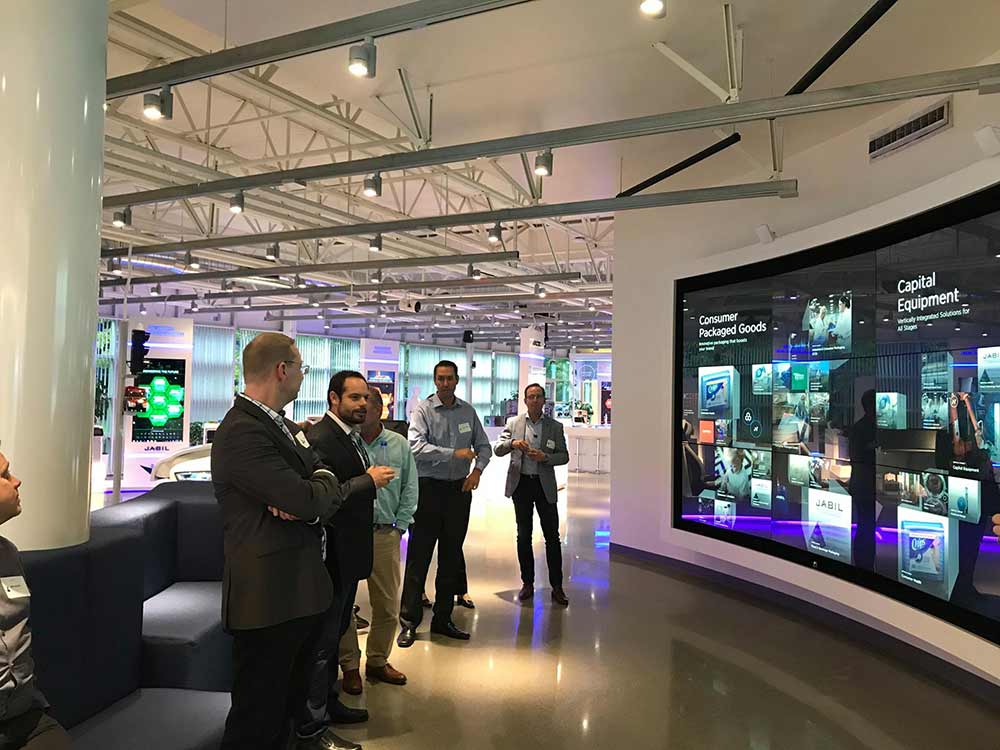Transforming a large manufacturing business is impossible without deploying an array of automation and logistics innovations, such as robotics and artificial intelligence. It is also unimaginable without startup scouting, a practice of partnering with young and fast-moving companies to make innovation happen faster. All these things were on a checklist for a group of Sonepar executives who visited Silicon Valley Innovation Center in September 2017.
Sonepar is a French manufacturer of electrical parts and products with a history that spans 45 years across 44 countries. If you have an old refrigerator or a vacuum cleaner at home, there’s a good chance that it’s using parts produced by Sonepar. Despite its glorious history, the company is currently struggling with fierce competition from Chinese manufacturers. Sonepar executives from Europe, America and Asia came to Silicon Valley to find solutions to this and their other ongoing challenges, namely growing production costs combined with digital disruption.
Companies we visited during a 3-day innovation program included Squadrone System, IngDan, Chariot, HP, SAP, UL Ventures, Jabil and others. At SVIC, our goal was to introduce the Sonepar delegates to the best ideas that could help them modernize their supply-chain and logistics business and equip them with the right tools to compete with e-commerce behemoths like Amazon. Here are some of the key takeaways from the trip as told by SVIC’s director of business development Russel Climaco-Estardo.

In order to stay afloat in the manufacturing business in our fast-paced digital era, companies need to:
Digitize the supply-chain with smart drones
Smart AI-powered drones help companies like Amazon automate warehousing. Sonepar executives admitted that their warehouses rely heavily on manual labor and use of paper. To show how drones can improve inventory control, we took our clients to Squadrone System. Eva Pagneux, the company’s then VP of Strategy & Marketing demonstrated how Sonepar can cut inventory time to minutes and increase data capture quality with a completely autonomous drone that navigates in alleys, guided by its companion app. She explained how a drone can fly in the evening and scan all the pallets and bars in its warehouse and log the data to a central inventory system. A fully digital, completely automated warehouse is the only way to build a scalable manufacturing business.

Lower production costs with 3D-Printing
Using 3D-Printing to offset production and delivery costs instead of making products in bulk was another idea that came up during the trip. We paired the team with Hewlett-Packard Labs, an exploratory and advanced research group for HP Inc. HP Labs presented 3D-Printing technology capable of saving millions of dollars each year for a business like Sonepar. Instead of using traditional injection molding technology, Sonepar could use old blueprints to 3D print parts for outdated cars, machines and appliances that are not produced anymore.
3D-printing, or additive manufacturing, is a truly revolutionary technology, which is fast and relatively cheap. It gives engineers more time to be creative and inventive, in comparison with traditional manufacturing methods. 3D printing is a must-have for every manufacturing business on the path of digital transformation.
Partner with innovative startups
“Acquihiring” is becoming a thing of the past, says Climaco-Estardo. Instead of buying out interesting startups, manufacturing businesses need to find reliable partners to work with and embed themselves deeper into the innovation ecosystem. This was a cross-cutting theme of Sonepar’s meetings with VC boutique Naiss, UL Ventures as well as a startup scouting workshop at SVIC. When a corporation acquires a young company, there’s a good chance it will kill off the innovation. Using startups as service providers is a smarter strategy, as it makes it easier to get to the innovative technology without spending too much money.

Innovation outpost
In a matter of three days, the Sonepar executives were able to get a grasp of what is shaping their industry and find inspiration to transform their business.
“We found some great startups to work with, that inspired us, challenged us and our thinking”, said Jo Verbeek, President and Chairman at Sonepar, Asia-Pacific Region.
This is a typical example of what we do at Silicon Valley Innovation Center. For most of our clients we are a first “innovation outpost”. Businesses from around the globe use our services to broaden their innovation horizons and find valuable partners to work with. Here in Silicon Valley we have access to thousands of innovative startups. Let us be your guide in the word of modern companies operating in manufacturing and supply chain management across such technologies as artificial intelligence, robotics and IoT.